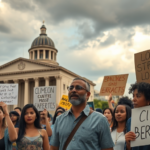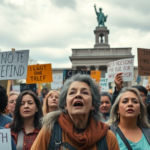Trump’s Executive Order Pressures Military to Dismantle Diversity Initiatives
President Donald Trump’s latest executive order, titled “Restoring America’s Fighting Force,” is set to dismantle all diversity, equity, and inclusion (DEI) efforts within the Department of Defense (DoD) and the Department of Homeland Security (DHS). This action, encompassing all uniformed services including the Coast Guard, represents a significant shift in military policies regarding diversity, causing both urgency and confusion within the ranks.
Directive Details and Immediate Reactions
The order requires military branches to eliminate DEI offices, part of a broader effort to strip diversity programs from federal operations. This continuation of Trump’s earlier initiatives mandates services to rapidly remove policies perceived as diversity-focused. The result is a scramble by military leaders to navigate these changes, with immediate actions already noticed such as the withdrawal of Air Force programs advocating for quality-of-life improvements.
Katherine Kuzminski, deputy director of studies at the Center for a New American Security, grounded the significance of this directive by stating, “The executive order extends beyond government employees to explicitly include uniformed service members, amplifying its impact.”
Within the Pentagon, there is a palpable sense of disorientation as officials dissect the implications of the order. The Defense Department has committed to executing the directives with professionalism, aligning with national security objectives while acknowledging the inherent challenges. As part of the implementation, Air Force educational content on historic units like the Tuskegee Airmen and female World War II pilots faced temporary removal until public outcry facilitated their reinstatement.
Impact on Local Communities and Institutions
The ramifications of this executive order are extensive, touching both the local military community and academic institutions. Military academies are under directive to evaluate leadership, curricula, and instructional programs to ensure adherence to the new policies. This raises concerns, particularly evident with the Air Force’s previous focus on recruiting diverse officer candidates.
In communities with strong ties to military bases, such as those surrounding San Antonio, Texas, the local impact of such federal changes can be significant. Dr. Maria Thompson, a sociology professor at Texas A&M University-San Antonio, argues, “The call to dismantle diversity programs in these contexts not only affects military structures but also echoes across local communities, potentially altering how diversity is perceived and valued region-wide.”
Residents closely linked to the military ecosystem express concerns about what these changes signify for inclusion efforts and opportunities for minorities and women in service. Daniel Perez, a retired Army officer living in the area, shares apprehensions common among veterans, “Efforts like these can set back years of progress in integrating diverse perspectives and talents essential to effective military operations.”
Linking Past Efforts with Current Challenges
The campaign against DEI efforts is not newly emerged. The Trump administration’s stance has resurfaced debates regarding policies, including the inclusion of transgender troops—a subject still divisive within military circles. Historical efforts to diversify military leadership and ranks have faced numerous challenges, but this recent directive heightens the stakes, prompting reevaluations of existing strategies.
Local voices like that of Jessica Morgan, a former Marine and diversity advocate, point out, “This decision refuels debates around what our military represents and who it serves. It’s vital for both the military and associated communities to critically assess what these policy shifts entail, and equally important, to maintain respect for everyone who raises a hand to serve.”
Future Implications and Ongoing Debates
As Secretaries Pete Hegseth of Defense and Kristi Noem of Homeland Security work against a 30-day deadline to implement Trump’s order, the future of diversity initiatives hangs in suspense. With a mandatory progress report due in just over a week, the respective departments face pressure to chart a clear course even as diverse perspectives and criticisms persist.
In communities heavily invested in diversity efforts, like those throughout Texas, the executive order’s potential to affect morale, recruitment, and retention within the military is a critical aspect of ongoing discussion. As these elements unfold, Woke News remains committed to examining both the local impact and the broader implications, ensuring residents are well-informed of developments as they occur.
For those interested in following discussions or engaging with local efforts concerning military diversity and inclusion, resources are available through organizations such as the American Veterans Committee of San Antonio, which continues to host forums and support initiatives related to veterans and community diversity outreach.







